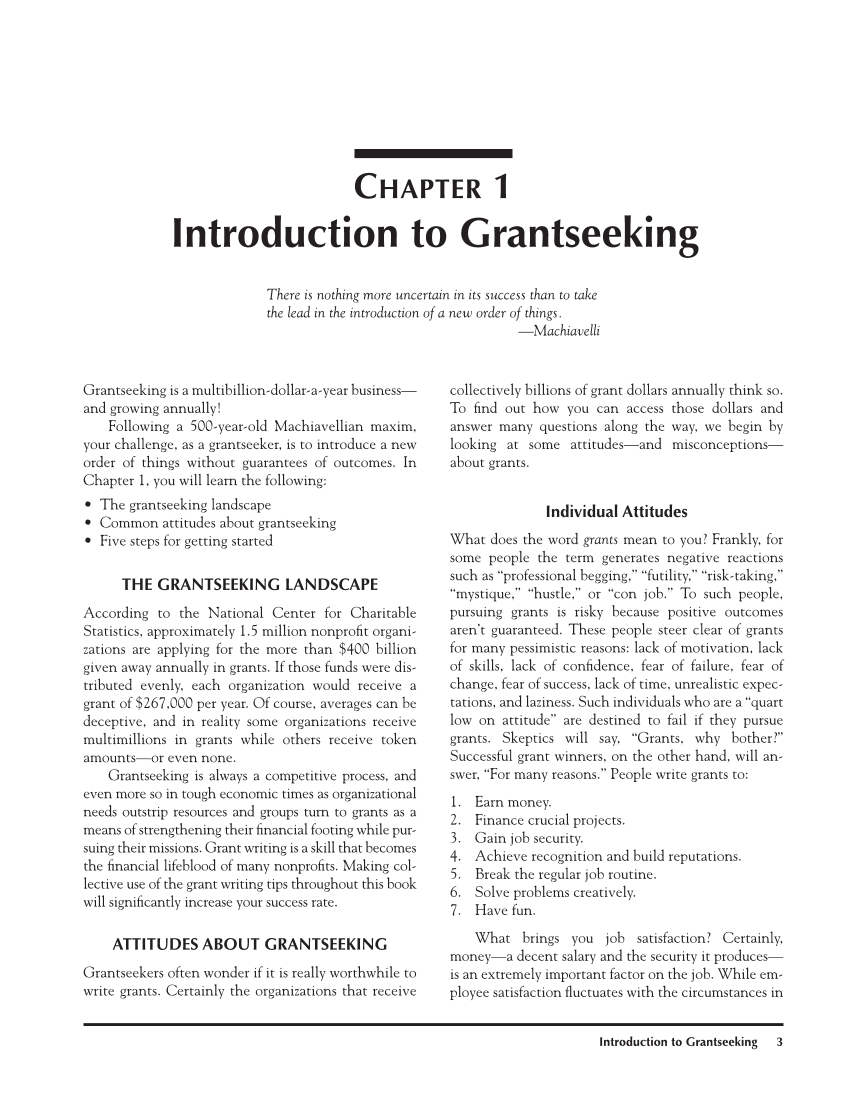Introduction to Grantseeking 3 collectively billions of grant dollars annually think so. To find out how you can access those dollars and answer many questions along the way, we begin by looking at some attitudes—and misconceptions— about grants. Individual Attitudes What does the word grants mean to you? Frankly, for some people the term generates negative reactions such as “professional begging,” “futility,” “risk-taking,” “mystique,” “hustle,” or “con job.” To such people, pursuing grants is risky because positive outcomes aren’t guaranteed. These people steer clear of grants for many pessimistic reasons: lack of motivation, lack of skills, lack of confidence, fear of failure, fear of change, fear of success, lack of time, unrealistic expec- tations, and laziness. Such individuals who are a “quart low on attitude” are destined to fail if they pursue grants. Skeptics will say, “Grants, why bother?” Successful grant winners, on the other hand, will an- swer, “For many reasons.” People write grants to: 1. Earn money. 2. Finance crucial projects. 3. Gain job security. 4. Achieve recognition and build reputations. 5. Break the regular job routine. 6. Solve problems creatively. 7. Have fun. What brings you job satisfaction? Certainly, money—a decent salary and the security it produces— is an extremely important factor on the job. While em- ployee satisfaction fluctuates with the circumstances in Grantseeking is a multibillion-dollar-a-year business— and growing annually! Following a 500-year-old Machiavellian maxim, your challenge, as a grantseeker, is to introduce a new order of things without guarantees of outcomes. In Chapter 1, you will learn the following: • The grantseeking landscape • Common attitudes about grantseeking • Five steps for getting started THE GRANTSEEKING LANDSCAPE According to the National Center for Charitable Statistics, approximately 1.5 million nonprofit organi- zations are applying for the more than $400 billion given away annually in grants. If those funds were dis- tributed evenly, each organization would receive a grant of $267,000 per year. Of course, averages can be deceptive, and in reality some organizations receive multimillions in grants while others receive token amounts—or even none. Grantseeking is always a competitive process, and even more so in tough economic times as organizational needs outstrip resources and groups turn to grants as a means of strengthening their financial footing while pur- suing their missions. Grant writing is a skill that becomes the financial lifeblood of many nonprofits. Making col- lective use of the grant writing tips throughout this book will significantly increase your success rate. ATTITUDES ABOUT GRANTSEEKING Grantseekers often wonder if it is really worthwhile to write grants. Certainly the organizations that receive Chapter 1 Introduction to Grantseeking There is nothing more uncertain in its success than to take the lead in the introduction of a new order of things. —Machiavelli
Document Details My Account Print multiple pages
Print
You have printed 0 times in the last 24 hours.
Your print count will reset on at .
You may print 0 more time(s) before then.
You may print a maximum of 0 pages at a time.
















































































































































































































































































































